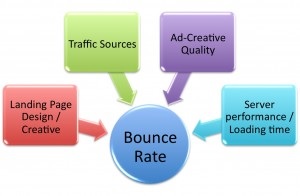If you are ranking well in search engines and driving traffic to your website through on-line marketing then you are already in pretty good shape compared to a lot of the competition. However, if your website is seeing really high bounce rates, you might not be fully exploiting the traffic that you get. Your bounce rate can drastically affect the success of your website, but there are ways to reduce it. Let’s have a look at a few.
1. Reducing Load Times
You may not even think about load times if you constantly have access to high speed internet, but you must recall that not everyone, even in 2013, is so lucky. Test your page with a slower Internet connection to make sure that it doesn’t take minutes to load. Also, try to optimize your page for mobile viewing. Not having your site friendly for smartphones is just asking for people to bounce. In an age where people expect instant satisfaction, making your page load just half a second faster can make all of the difference.
2. Targeting Keywords That Matter
Don’t try to rank your website for keywords that are irrelevant to what your website is about. Target keywords that are very much related to what your site is offering. No one likes to click through to a website that they found by searching for certain keywords, only for the site to not have what they are looking for. Always make sure that your keywords match the content.
3. Adding Some Urgency
If you are selling something, then you should know that special offers can get your customers buying your products pretty fast. That said, if the offer doesn’t make them panic for their credit card because it’s going to end soon, then they might wait another day and then forget about it altogether. So on the headline, emphasize the fact that your offer is ending soon, and that supplies are limited, so get them while they’re hot. For some, an urgent offer may be the deciding factor if they’re going to buy your product or not.
4. Get a Second Opinion
If people are leaving your landing/home page, it might be a problem with the page itself. Browser incompatibility, a page that is confusing to navigate, not enough bells and whistles, too many bells and whistles, horrible font that doesn’t go well with the colors, the list goes on. There are many factors that can play a part in why people bounce. It’s not always obvious what the issue is. That said, show some people your page and see what they think about it. Show it to web professionals, but also to people that are part of your target audience. User feedback is very important for the success of your website. The only way to improve is through accepting criticism, and making changes when something isn’t working. Even if it means changing a part of the website that you spent weeks trying to get just right.
If you target the right keywords and keep listening to your audience, you’ll see your bounce rate improve eventually.



